Why Your Corgi Isn’t Eating? 5 Reasons
As a Corgi owner, you might find yourself in a situation where your beloved canine companion suddenly loses interest in their food. This can be concerning and confusing, especially if your Corgi has always been an enthusiastic eater. It’s essential to determine the cause of this behavior so that you can take appropriate steps to help your Corgi regain their appetite and ensure they maintain optimal health.
There can be various reasons why your Corgi might not be eating, ranging from medical issues to temporary stressors. Identifying the cause will help you tackle the problem directly, whether it’s adjusting their diet, addressing environmental factors, or seeking veterinary attention in more severe cases.
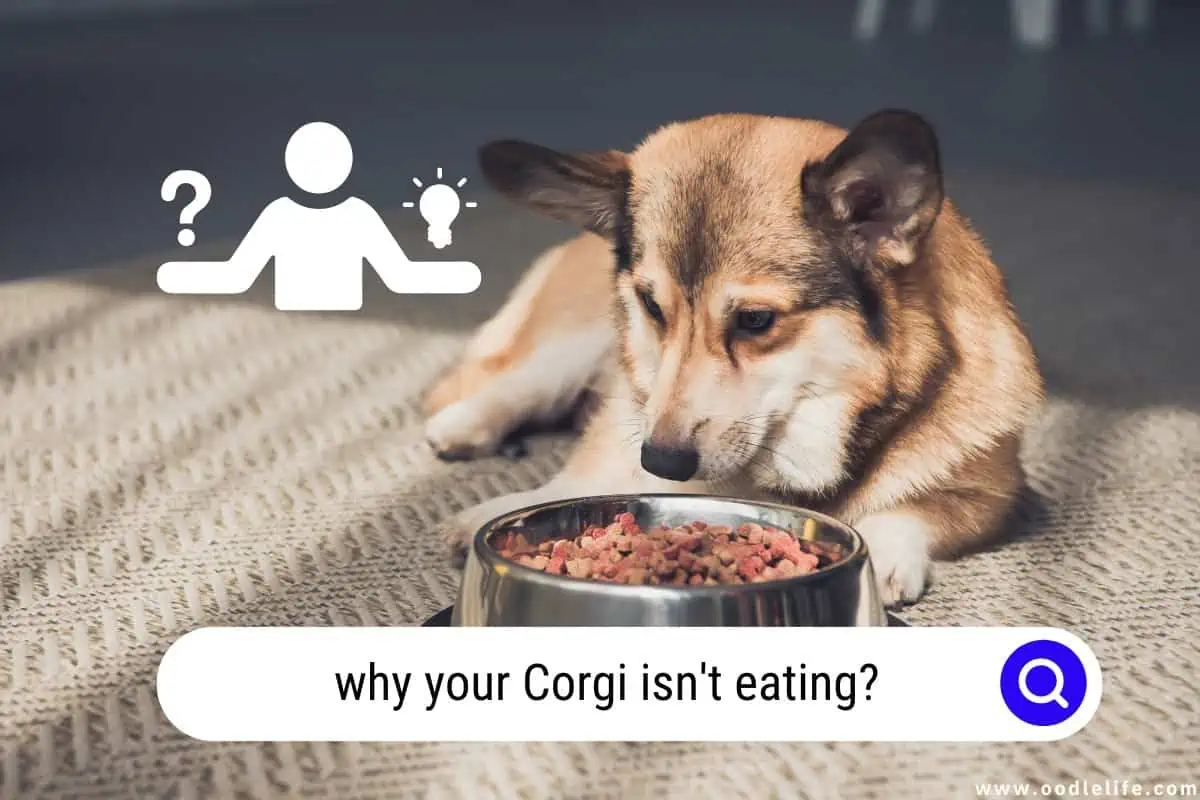
Remember that your Corgi’s wellbeing is paramount, and working to understand their eating habits is crucial to ensuring their happiness and longevity.
Key Takeaways
- Identifying the cause of your Corgi’s loss of appetite is crucial for effective solutions.
- Diet adjustments and addressing environmental stressors can help improve your Corgi’s eating habits.
- Seek veterinary attention if symptoms persist or worsen, to rule out any serious health concerns.
Identifying the Cause
Health Problems
Sometimes our beloved Corgis may experience a loss of appetite due to an underlying health issue. It’s essential to observe any changes in their eating habits as these might be indicators of a more serious medical issue. For example, kidney disease, diabetes, or cancer might cause your Corgi to lose their vigor for meal times.

If you suspect that your Corgi might be in pain or experiencing any illness-related symptoms, it’s best to take them to the vet for a proper diagnosis and to discuss medications or treatments that can help.
Dental Issues
Another possible reason your Corgi isn’t eating could be dental problems. Dogs, like humans, can experience dental disease, inflammation, or even develop a tumor in their mouths, which could lead to discomfort or pain during mealtime. A simple dental checkup can help identify any dental issues your Corgi might be facing.
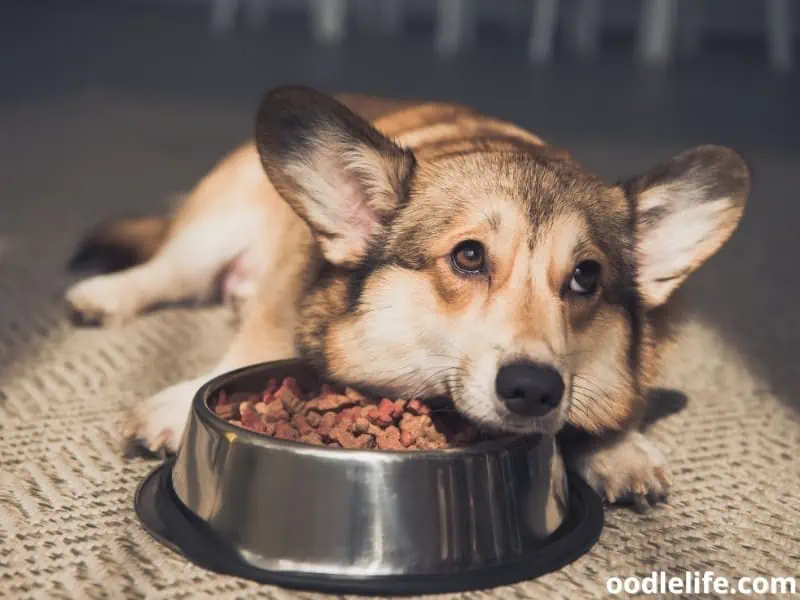
Remember, as good pet parents, we need to pay attention to our Corgis’ dental hygiene – those charming smiles don’t maintain themselves!
Environmental Factors
Finally, your Corgi’s eating habits might be affected by environmental factors. Their usual eating spot might be located near a noisy construction site, or perhaps they recently experienced a sudden change in their routine. Environmental changes can be stressful for dogs, leading to stomach problems or even temporary blockages in their digestive system.
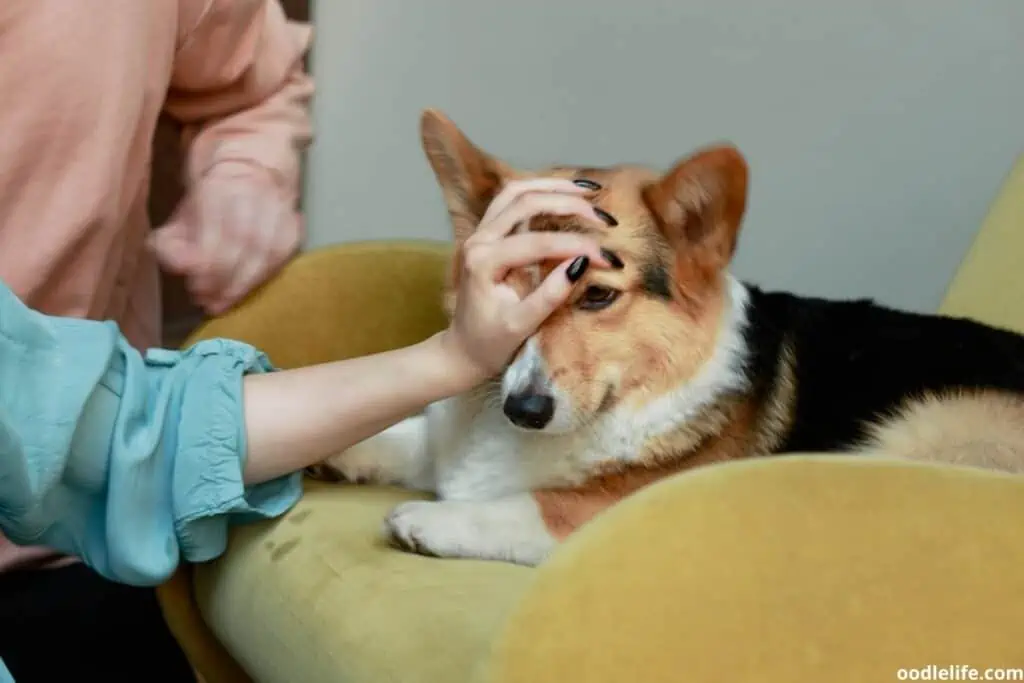
Make sure your Corgi is eating and drinking normally to avoid dehydration. Try setting up their feeding area in a more comfortable and familiar environment. Remember, when in doubt, it’s never a bad idea to have a chat with your vet to ensure your Corgi is in good health and receiving appropriate care.
Diet and Feeding
New Food
When introducing new food to your Corgi, it’s essential to consider that they might not accept it immediately. Just like humans, Corgis have preferences too. When switching foods, try mixing the new and old food together and gradually increase the new food’s proportion.
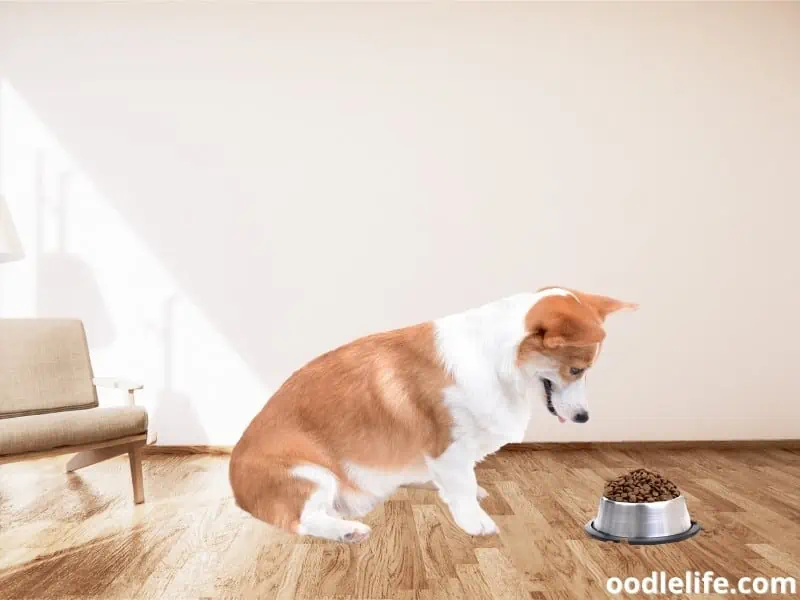
It’s possible your Corgi doesn’t like the taste of the “Taste of the Wild” blend you found on sale. Maybe they prefer proteins like chicken instead of bison.
Quality and Safety
The quality and safety of your Corgi’s diet are just as crucial as their human counterparts. Ensure that their food has appropriate proportions of proteins, vegetables, and fruits to maintain a balanced diet. Remember, obesity in dogs is just as problematic.
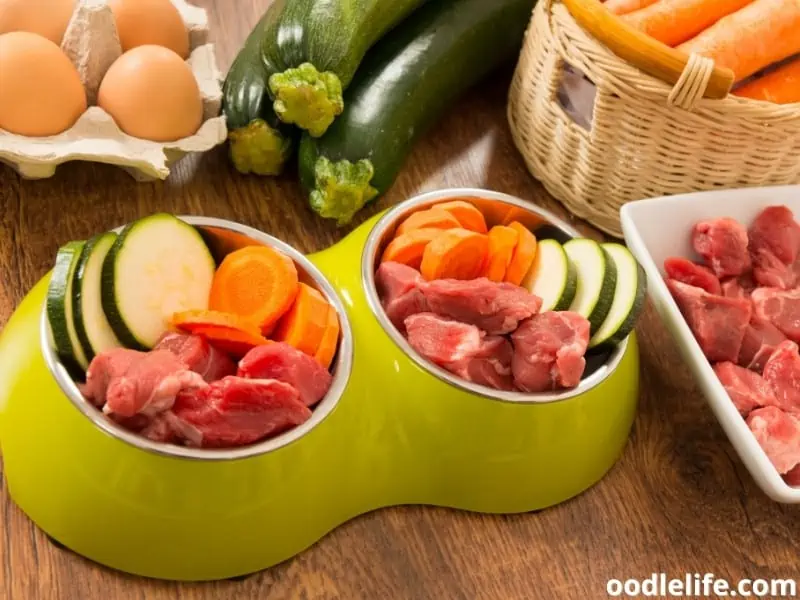
So, be cautious of overfeeding your Corgi with high-calorie foods, or you might end up with a tubby little pup instead of a hungry one.
Dry Food versus Wet Food
Choosing between dry and wet food can be a challenge. While it’s often subjective, some Corgis might prefer one over the other. Wet food can be more palatable and contain more moisture, which could help your pup’s appetite, especially if they’re not big drinkers.
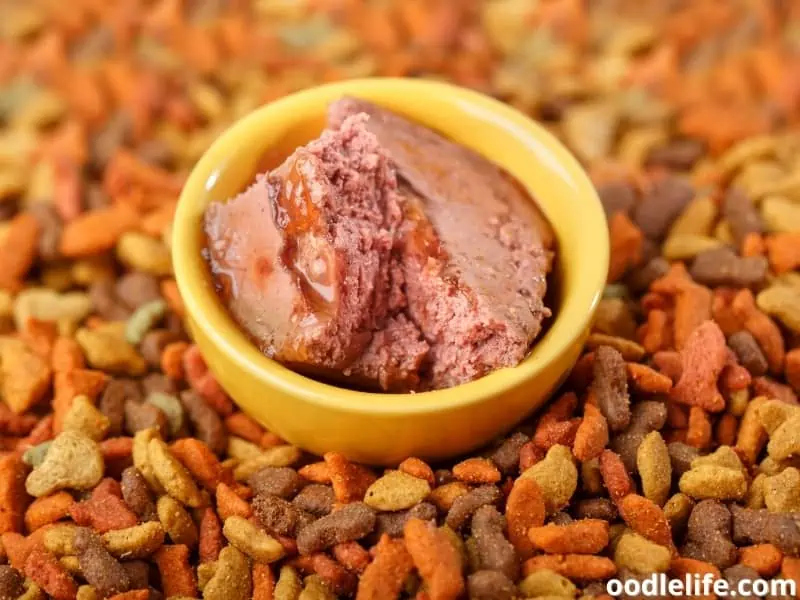
On the other hand, dry food has benefits like being easier to store and helping to maintain dental hygiene. Don’t hesitate to experiment using both types to suss out your Corgi’s preference.
Feeding Schedule
Establishing a consistent feeding schedule can greatly affect your fluffy friend’s appetite. Corgis, like most dogs, thrive on routine. Ideally, adult Corgis should be fed twice a day, while puppies may require three or four times daily.
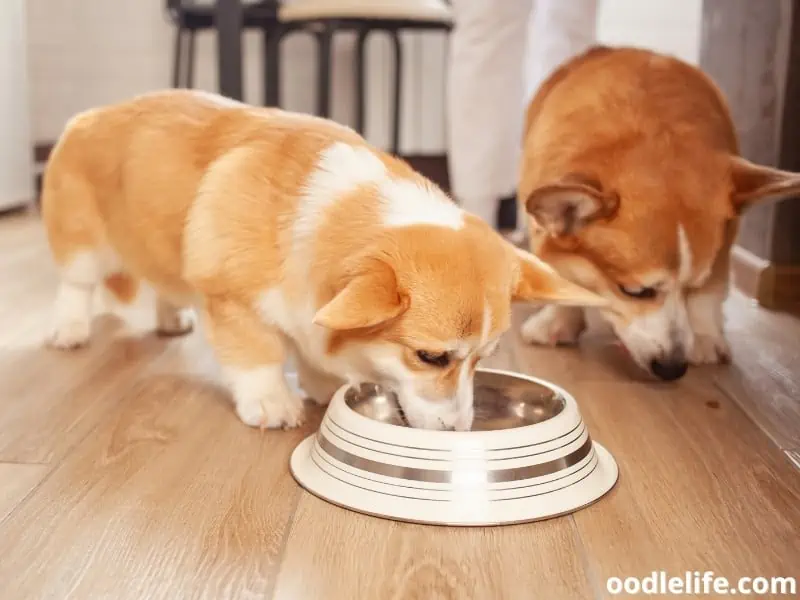
Try to stick to similar feeding times each day and observe if any changes occur in your Corgi’s appetite.
In conclusion, a Corgi’s eating habits can be influenced by various factors like food type, quality, and scheduling. With a touch of observation and some trial and error, you’ll likely figure out how to keep your Corgi happily fed. Just remember not to turn them into a rotund little loaf while doing so!
Stress and Behavioral Factors
Moving House
Moving to a new home can be a significant source of stress for your Corgi. The sudden change in environment and routine can cause them to feel disoriented and anxious. This anxiety may affect their appetite, leading them to eat less or not at all.

To help your Corgi adjust to their new surroundings, try to maintain a consistent feeding schedule and make sure their familiar food and water bowls, as well as their bed, are present in the new house.
New Pet
Introducing a new pet into the household can also trigger stress-related eating issues in your Corgi. They may feel threatened or overwhelmed by the presence of the new animal, causing them to lose their appetite as a result. Be sure to monitor the interactions between your Corgi and the new pet closely, and provide each animal with their own space and feeding area.

Gradually integrating the new pet into the household can help alleviate your Corgi’s stress and improve their eating habits.
Aging and Metabolism
As your Corgi ages, its metabolism naturally slows down, and this can directly impact its appetite. An older Corgi may eat less or more slowly due to decreased energy levels and changing nutritional needs. Be sure to consult your veterinarian about adjusting your dog’s diet to meet the changing demands of their body.
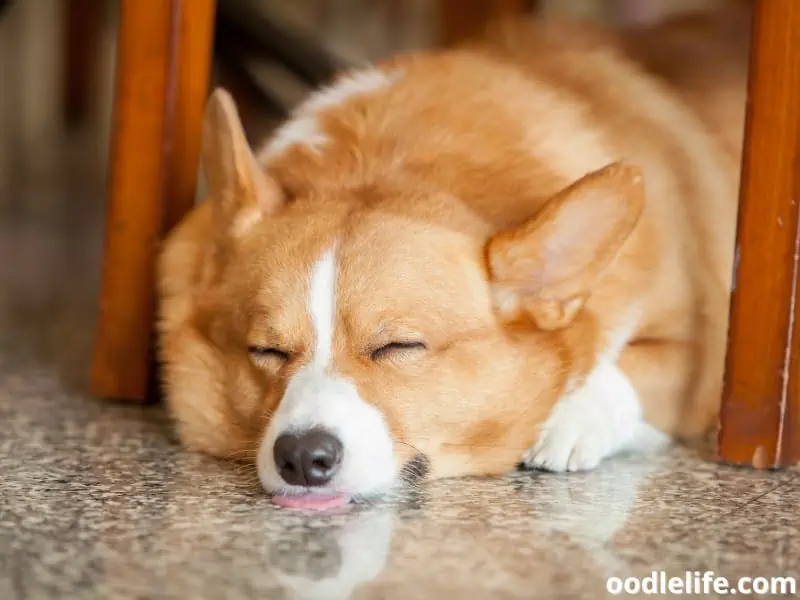
Don’t mistake their decreased appetite for stress-related behavior, as it may just be a natural part of aging!
In summary, various stress and behavioral factors can contribute to your Corgi not eating. Paying attention to your dog’s well-being and adapting to their needs at each stage of their life can help to ensure they maintain good eating habits.
Symptoms Requiring Veterinary Attention
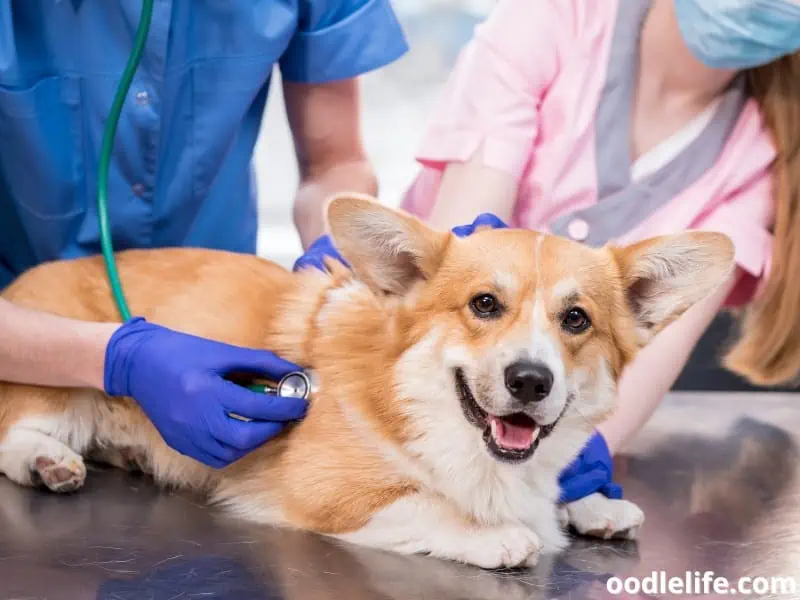
Vomiting and Diarrhea
If your Corgi is suddenly refusing food and experiencing vomiting or diarrhea, it’s time to pay a visit to the vet. These symptoms might indicate an upset stomach or an infection. Remember the time your aunt Susan ate that questionable sushi, and the aftermath wasn’t pretty?
Well, our furry companions can also suffer from a similar situation.
Sometimes, it could be something they ate – like a sneaky bite of that chocolate cake you thought was out of reach. Other times, it could be a more serious issue like an intestinal obstruction.
Weakness and Fever
Just like us, dogs can feel under the weather – and that includes our lovable Corgis. If your pup is experiencing weakness and fever, it’s a red flag for a possible underlying issue that needs vet attention. Imagine being sick and not being able to tell anyone what’s wrong – it’s pretty scary, right?
So, when you notice your Corgi is lethargic and not their usual spunky self, don’t hesitate to consult a professional.
It’s important to remember that dogs can’t tell us when they’re sick. That’s why monitoring their behavior and being attentive to any changes are crucial.
Unexpected Weight Loss
Are you noticing your Corgi is losing weight suddenly while still refusing food? This could be a sign of a more severe health issue. Just like humans, it’s never a good sign when our weight dramatically changes without a known reason.
If you ruled out Aunt Susan’s new light-doggy-diet experiment, it’s time to consult your veterinarian and get to the bottom of your Corgi’s appetite loss. Unexpected weight loss could be a sign of an underlying medical concern that needs to be addressed as soon as possible.
Potentially Harmful Food Items
Toxic Foods
Corgi owners, be aware! There are certain foods that can be toxic to our furry friends. For instance, chocolate is a well-known no-no.

Loaded with the poisonous compound theobromine, it’s likely to make our Corgis sick, causing symptoms like nausea. As for onions and garlic, they’re part of the Allium family, which can cause damage to your Corgi’s red blood cells, resulting in anemia.
Here’s a brief list of some toxic foods to avoid feeding your Corgi:
- Chocolate
- Onion
- Garlic
And a pro-tip – don’t be fooled by those pleading eyes. Sharing your chocolate bar isn’t worth the risk!
Unsafe Foods
Now, these next items might not be highly toxic, but they’re still pretty unsafe for your Corgi’s digestive system. We’re talking about rancid foods – anything past its prime or expired. Trust us, the last thing you want is a case of doggie food poisoning.
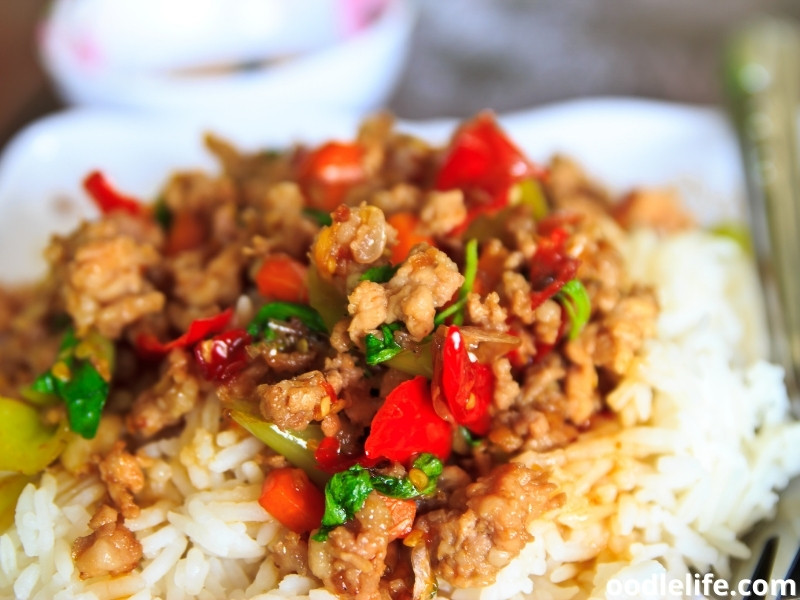
Similarly, you may have heard that rice can be helpful in settling a dog’s upset stomach. Well, that’s true, but not all rice is created equal. Go for plain, boiled white rice; avoid giving your Corgi seasoned, spicy, or fried rice as it might lurk those pesky onions and garlic we talked about earlier.
In summary, always keep an eye on what your Corgi is eating and avoid these potentially harmful food items to ensure their safety and well-being. Remember, what might be a harmless snack for you can have serious consequences for our little four-legged companions.
Effective Treatments and Solutions

Addressing Medical Issues
Sometimes a Corgi’s lack of appetite can be due to medical problems. If you suspect something is off, consult with a veterinarian. They may prescribe treatment or medication to resolve possible health issues.
For instance, Allium Cepa can be used as a remedy for stomach upset after eating fatty foods (source). Just like the Queen of England treats her Corgis with homeopathy, you can also explore alternative therapies if conventional treatments don’t work.
Alleviating Environmental Stressors
Corgis can be sensitive to their environment, and stress may cause them to lose their appetite. Here are some suggestions to help your four-legged friend feel more at ease:
- Create a separate, calm eating area away from loud noises and distractions.
- Maintain a consistent routine for feeding, walks, and playtime.
- Socialize your Corgi with other dogs and people in a controlled, positive way.
Remember that a relaxed Corgi is a happy Corgi. Much like humans, if we’re stressed out, we might not eat as much either. So keep that Corgi zen!
Adjusting Diet and Feeding Habits
Corgis, like people, can be picky eaters. Here are some tips to help your Corgi regain their appetite:
- Gradually introduce new food, mixing it in with their current diet, to avoid sudden changes that might shock their system.
- Pay attention to your Corgi’s preferences and consider high-quality, nutrient-rich food options.
- Try adjusting portion sizes or feeding frequency; some Corgis may prefer smaller meals throughout the day.
Remember, a healthy diet is essential for your Corgi’s overall wellbeing. Like that one time you tried eating just celery for a week, sometimes a change in diet is all you need to feel better. Happy eating!
Frequently Asked Questions
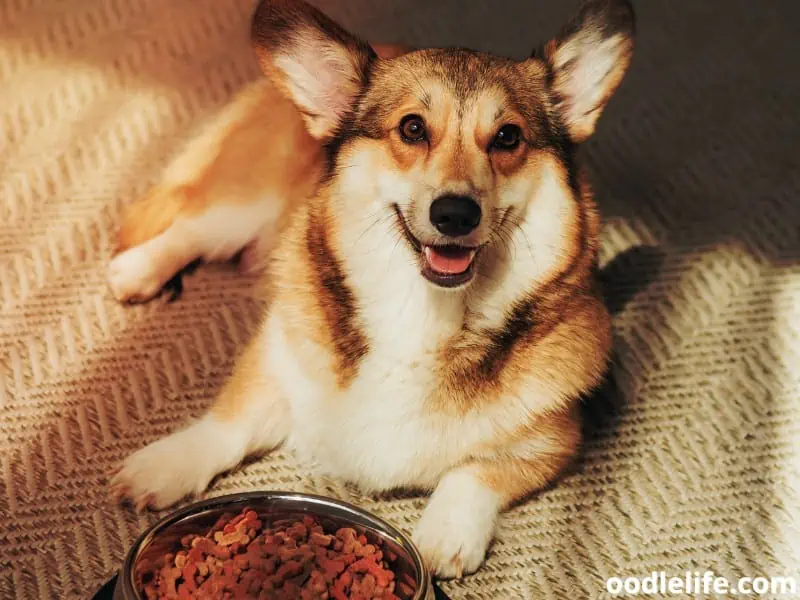
Why is my dog suddenly not eating?
There could be various reasons why your Corgi isn’t eating suddenly. It could be due to stress, illness, or even a change in their environment. Make sure to monitor your dog closely, and if their appetite doesn’t improve, consult your vet for further guidance.
Are Corgis picky eaters?
Corgis are not typically known for being picky eaters. However, every dog has its individual preferences. Try offering different healthy food options to your Corgi to figure out if they are just being selective with their food.
When should I worry about my dog not eating?
If your dog has stopped eating for more than 24 hours, it can be a cause for concern. A loss of appetite can be a sign of an underlying health issue. It’s important to contact your vet if you notice your Corgi is not eating for a prolonged period.
Why is my dog not eating but acting normal?
Even if your Corgi is behaving normally, a lack of appetite can still be concerning. Monitor for any sudden changes in behavior, energy levels, or weight loss, and consult your vet if needed. Sometimes, your dog might just need some extra encouragement to eat.
How can I encourage my Corgi to eat?
To encourage your Corgi to eat, try adding some low-sodium chicken broth or wet food to their regular kibble. You can also hand-feed your dog or use a puzzle feeder to make mealtime more engaging and fun for your furry friend.
Should I change my Corgi’s diet?
If your Corgi is consistently not eating, it might be worth considering a change in their diet. They could have developed an intolerance or sensitivity to certain ingredients in their current food. Speak with your vet before making any substantial changes, as they can help determine the best course of action based on your Corgi’s preferences and nutritional needs.